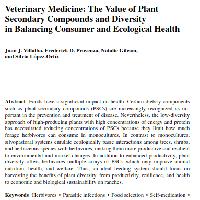Resumen
-
Foods have a significant impact on health. Certain dietary components such as plant secondary compounds (PSCs) are increasingly recognized as important in the prevention and treatment of disease. Nevertheless, the low-diversity approach of high-producing plants with high concentrations of energy and protein has necessitated reducing concentrations of PSCs because they limit how much forage herbivores can consume in monocultures. In contrast to monocultures, silvopastoral systems emulate ecologically basic interactions among trees, shrubs, and herbaceous species with herbivores, making them more productive and resilient to environmental and market changes. In addition to enhanced productivity, plant diversity offers herbivores multiple arrays of PSCs which may improve animal nutrition, health, and welfare. Thus, an ideal feeding system should focus on harvesting the benefits of plant diversity, from productivity, resilience, and health to economic and biological sustainability on ranches.
